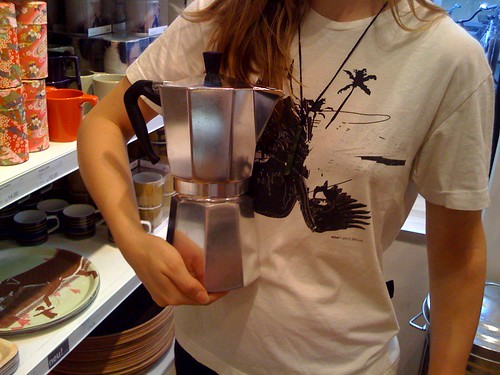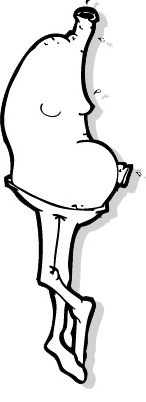Recommended Daily Dosage
Sunday, 28 December 2008 by kinakoJam

I'm still not sure if this Bialetti stove-top coffee can, seen at Habitat in Neumarkt, is supposed to be taken seriously - but in terms of volume it might represent my daily coffee consumption quite well.
When serious baristas talk about the ideal ratio of coffee grounds to liquid extracted, they're obviously talking about real pump-driven espresso - not these stove top abominations. So let's not bother to try and figure out just how overextracted the grounds in this Bialetti would become.
One of the first 'articles' I wrote for our school newspaper The Flannel was about the characteristics of proper espresso and the history of coffee-drinking in New Zealand's capital city.
It was a tumultuous saga of Swiss, Polish and Italian immigrants, of a hard-bitten lamington-serving cafeteria called the Matterhorn giving way to dutiful Italian espresso machines embraced by hordes of government employees and academics.
Sure, a teenager writing about espresso is 'just a tad' pretentious. But being a student at the inner city Wellington High School is all about skipping school, hanging around Cuba St when you're supposed to be in biology class, snacking on apples and Cookie Time cookies, then bumping into your mates and getting coffees, 'cause you're too old for shoplifting now.
Early on I was dragged to cafés with my mother, where we would look at expensive import magazines or read library books (one of Wellington's good spots used to be the Lido opposite the Civic Square and public library).
Later, when working at a café with a punk chef, a horny gallerist and a gay linguist, I learned to take due care with each cup. A flat white with corn fritters or dark Whittaker's Sante chocolate bars, a heaping spoonful of kiwi familiarity and a dollop or two of sarcasm, please.
I would honestly rather drink a strong stove top coffee or even a strong cup of plunger coffee than a weak espresso. Other forms of coffee can be appreciated on their own merits, I feel, though I am not really down with the cult of Bodum drip as practised in the USA and Japan.
As defined by Lord Jeffrey Steingarten, the predominant flavours should be "caramel, flowers (including jasmine), fruit, chocolate, honey, and toast - but only if you do everything right." (i.e. two tablespoons of 192 degrees fahrenheit water forced through seven grams of finely ground coffee under nine atmospheres of pressure for 25 seconds).
Otherwise, as Jeffrey notes: "One false step and you are totally doomed. One false step and you will never taste the jasmine."

hmm, i used to work in a cafe in my youth too, but never was much attuned to learning the lessons of perfect coffee making, perhaps I was too busy flirting with the other waiters or getting stoned in the staff loos to contemplate the finer aspects of coffee
As you know I'm a fan of drip coffee a la American and Japonaise, but I like a good espresso too.
Perhaps you can tell me why it is that I like the espresso that friends make me in their homes when they have a machine and I loved the espresso in Rome, but I find NZ espresso undrinkable???
I would like the know the answer to this because whenever I seriously ask a kiwi, instead of answering me they just act all offended and accuse me of having bad taste. The question is not meant to offend. I'm genuinely curious...
hah! I think skill as a barista is disproportionately due to how well the machine is maintained (good pressure, and clean) and the quality of the beans...
However good beans are not enough... having a really bad espresso made from Monmouth beans in Islington convinced me that a huge part is down to the machine and the barista...
In Wellington the Supreme coffee roaster guy came and did maintenance & tutorials all the time... the rest is down to common sense, or as my long-time barista friend calls it 'love'... running the water for the right amount of time, having a thermometer in the milk jug, frothing the milk so it's creamy, not pouring too many suds in the cup...pretty simple stuff!
i wish i was into drip, I like all the apparatus, there is a cafe in NYC that specialises in it which looks very cool
I remember you mentioned that about NZ coffee before, I think it is a completely reasonable proposition...
According to our friend Marco Passarani, the taste or mineral balance of the water is crucial... and if one is into milky coffees, obviously the taste of milk can vary widely..
As for the strength, this is a confusing point, since most NZ espresso bars use Italian made machines for pulling espressos, which presumably have the same sized coffee pucks and same amount of water extracted as in Italy...(most serious kiwi baristas I knew there were careful not to over-extract their espressos)
The roasters are the same worldwide, rotating drums.... commercial brands might use a fast roaster...
I guess, then, it must be down to the darkness of the roast... I think kiwis whetted their coffee tastes, like good dairy farmers, with capuccinos, lattes&flat whites
- so maybe that's why the roast started off being darker and stronger in flavour - because a weak-tasting milky coffee is a monstrosity for sure!
the trend for 'short blacks' came later in the antipodes, and I guess the robust style of a dark roast in a small cup appealed to all the (by then, hardcore) coffee drinkers in NZ, Australia and Seattle (which all seem to have a similar style of beans/coffee taste IMO).
A site called 1stincoffee.com says: "Popular thought might lead you to believe that espresso must be an extremely dark roast; however the espresso roast varies from region to region. In California, you would be most likely to encounter a dark or "French" roast. On the east coast of the US, a light roast is often preferred. And in Northern Italy, a medium roast is generally used. Any roast can be used to make good espresso. It is entirely a matter of taste."
The stove top espresso maker is still my last resort before hitting up the plunger.
I'm still fascinated by the water quality issue with coffee and how much difference it makes. I'm not sure that I could convince someone with a decent machine to run bad water through it just to test my theory. I don't really know anyone who owns a decent machine.